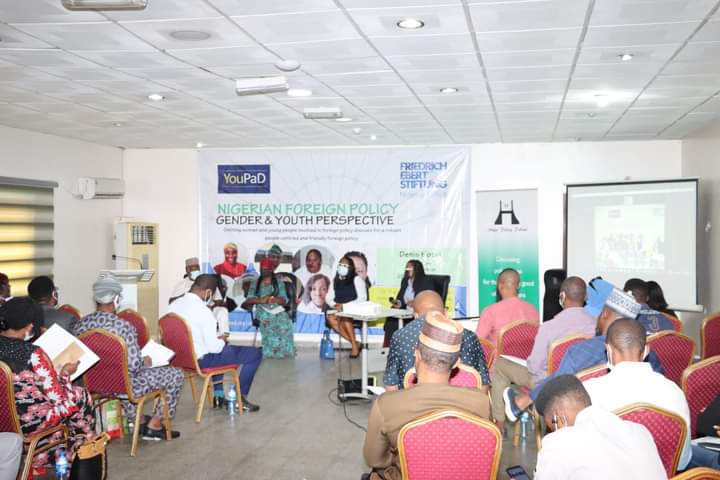Maureen Okpe
Stakeholders in gender and youth circles have expressed dissatisfaction over the continuous exclusion of women and youth in Nigeria’s Foreign Policy.
This formed the core of discussions at a forum organized Tuesday in Abuja by Friedrich Ebert Stiftung in collaboration with YouPAD on the theme, ”Nigeria’s Foreign Policy: Youth and Gender Perspective”.
Presenting a paper titled ”Towards Women’s Participation in Nigeria’s External Political-Economic Relations” a Lecturer at the University of Nigeria Enugu campus Dr Obinne Obiefuna, worried that the limited inclusion of women and youth in political and economic participation has resulted in the rating of Nigeria as the poverty capital of the world with 93.9 million poor persons.
According to her, ” the difference in economic and political opportunities for men and women in Nigeria is stark”, adding that the gender disparity and stereotyping of women as subservient as laws meant to empower women were not practiced.
She lamented that Nigeria, rather than enabling women to contribute to the economy, still has several laws on the books that make it harder for women to work than men, noting that the law does not mandate nondiscrimination in employment based on gender, nor equal remuneration for work of equal value.
”While International best practice is shifting from female exclusion to inclusion, the Nigerian government is either unaware or clueless of the taxable income to be obtained when women and youth are gainfully employed, or involved in the political decision making positions,” she said.
She, therefore, harped the need for gender inclusion to be prioritized in the government’s foreign policy to enable companies and civil society to emulate thereby enabling better and faster development in the country.
Also presenting a paper titled ”Nigeria first’ Foreign Policy:Mainstreaming Youth Perspectives”, the Programme Manager at CISLAC, Salaudeen Hashim, stated that
a well-thought policy should originate from within to promote shared values, standards, and mutual interest, adding that ”Nigeria should walk the talk, announcing its policy thrust with content and concerted efforts”.
“For the world to take Nigeria seriously, its foreign policy must accomplish the country’s development aspirations and objectives to the improvement of the citizens and Impact focus on the youth. Nigerian missions abroad must actively engage the Nigerian community, particularly young people.
“Every Nigerian foreign policy endeavour must meet the litmus test of determining Nigeria’s National Interest and Foreign Policy. The country needs a virile, competent and efficient public institution to be kept alert, transparent, responsive and accountable for any Foreign policy to flourish,” he stressed.
Speaking during a panel discussion, a seasoned Journalist Nnenna Ibeh, advocated for a genuine policy, and in tandem with stipulations of development, noted that Nigeria is yet to get it right as regards policies and principles for diplomatic interactions.
”We are yet to get it right locally, how much more on the international playing field. Nigeria’s first policy should be able to place every Nigerian citizen as an individual above every other thing.
“Again, we need to get our economy on the right pace, we cannot be borrowing left, right and centre and expect other nations to respect us. There is strength in financial stability even in small units like our families we see that play out. Respect is earned, Nigeria needs to earn its respect,” she said.
She regretted that the Nigerian government relegated the youths to the background just as she lauded the youth for creating a niche for themselves, stating that this became possible following their zeal, energy and access to information and technology to push for what is right.
“I am not sure the older generation would allow youths to thrive as they should anytime soon. But the youth need to start working together, create networks for purposeful interactions that could push for platforms through which they can break free. And until that happens, we will continue to remain where we are,” she said.

